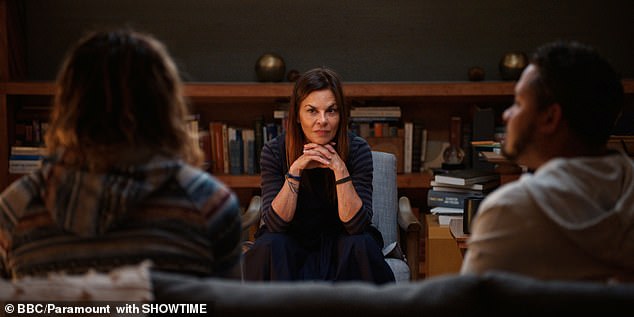You might imagine that having reached the pinnacle of your career, you’d be satisfied. A life of plaudits and comfort awaits you. Surely now you are happy with your lot.
But so often this isn’t what happens. Sir Bradley Wiggins won Olympic gold medals on the track at the Athens, Beijing and Rio de Janeiro Games, and also won the road time trial at London 2012, two weeks after becoming the first British rider to win the Tour de France.
For 15 years he was at the peak of his sport, a celebrated national treasure and cycling icon. He was appointed CBE in 2009 and knighted in 2013.
Yet in an interview last week he confessed that in the years after his career ended in 2016, he became seriously addicted to cocaine, risking not only his reputation but his life.
‘There were times my son thought I was going to be found dead in the morning,’ he said. ‘I was a functioning addict. People wouldn’t realise – I was high most of the time for many years.’
You might think this is unusual, but I can assure you, there are far more ‘functioning’ addicts than you would imagine, particularly when it comes to cocaine and particularly among those you would otherwise think are successful. They are hidden in plain sight.

There are far more ‘functioning’ addicts than you would imagine, particularly when it comes to cocaine and particularly among those you would otherwise think are successful
While other drugs such as alcohol or opiates have telltale signs – the smell, the sedation or sluggish movement – it’s harder to spot when people have used cocaine.
They will usually develop a pattern of use that minimises the chances of being found out, taking the drug at particular times, or having routines that mean they can use without it impacting on their key duties and responsibilities.
I use the term ‘functioning’ with caveats, of course. In lots of ways, it’s misleading and they are not functioning. Yes they might hold down a job, have a family and outwardly appear respectable and happy. But on a deeper, more meaningful level, it has all gone awry.
Functioning is not about simply going through the motions of living. It’s engaging day-to-day with the world around you and the people in it. Cocaine users are anaesthetising themselves to all that, living behind a barrier and psychologically stepping away from the people closest to them.
What we really mean by ‘functioning’ is that they exist in society unseen and undetected. These are the addicts who manage to hide their addiction better than others.
And what that means, in turn, is that the addict can often kid themselves that they’re managing OK. Their life hasn’t imploded. They haven’t lost their job or wrecked their health, at least not obviously, and so surely they’re one of life’s winners?
The reality is a ‘functioning’ addict is in just as much torment, just as much distress, as a ‘non-functioning’ addict. And the fact they haven’t lost it all is purely a matter of luck.
In more cases than not, these people are walking a tightrope, one tiny gust of wind away from crashing to the ground. Sometimes they slip up and get caught red-handed taking drugs, but that’s not the most likely cause of their downfall. More often, it’s an unexpected incident that tips the balance: a bereavement, a rocky patch in their relationship, a tough time at work.
Then, suddenly, they need to use more drugs to numb themselves to what’s happening and get through the day. They start using at work or at family events. People notice, and that carefully curated routine that meant they could hold it all together collapses. The steady downward spiral begins.
I once had a patient who had been using cocaine daily for nine years. Everyone around her was utterly unaware until her husband lost his job and it put a strain on their marriage. She started using more and suddenly, for the first time in nearly a decade, the mask slipped and people began to notice she was acting strangely.
Sometimes she would stay up for days on end and, of course, in time her family and colleagues became suspicious. She told me she felt like a dancer who couldn’t actually hear the orchestra that she had to dance to. But she had learned the steps so well, no one watching her would ever know.
When her marriage began to struggle, it was as though a new conductor had taken control of the orchestra and very slightly changed the tempo. Suddenly, everyone could see she was only pretending to dance to the tune the orchestra were playing.
That rather beautifully sums up the tragedy of so-called functioning addicts for me. There they are, going through the motions of life, but not really living it, waiting for the tempo to change and it all come crashing down.
I admire Kim’s strength

Kim Kardashian returning to her hotel after an evening dining out in Paris
Whatever you think of Kim Kardashian, there’s no doubt being tied up and robbed at gunpoint in a Parisian hotel was a horrific experience.
Taking to the witness stand last week at the trial of the burglars, she described how, in the aftermath, even at home, ‘if someone was coming up the stairs and I called out to them and they didn’t reply, I’d start crying because it reminded me of that time’.
A lot of people who have been a victim of violent crime will understand this – it’s a form of hypervigilance where your brain is constantly scanning for threats. It can be incredibly debilitating. I was particularly impressed by her efforts to move past it using therapy. Today, she said, she has got to a place where she can forgive the people accused of taking her hostage. She is also lucky to be able to afford therapy, of course – many others can’t.
It upsets me to think there are other victims who would benefit from help like this but simply can’t get it.
The Royal College of Psychiatrists has voiced its opposition to the assisted dying Bill in England and Wales over ‘many, many factors’. This is important because under the Bill’s current stipulations, a panel including a psychiatrist would oversee assisted dying cases.
I share the college’s concerns. While I don’t object to assisted dying in principle, and understand the arguments for it, I am wary of the lack of safeguards in place. At present, it is open to abuse and coercion. Let’s make no bones about it, we are talking about doctors killing patients. It feels rushed and ill thought out.
Dr Max prescribes… Couples Therapy

Couples Therapy follows the journeys of real life couples who are seeking help in their relationships
I’ve just caught up with this extraordinary TV programme that follows couples who have therapy to address relationship issues.
The therapist is a psychoanalyst so is always looking at the deeper, unconscious issues that underlie the problems they face. It’s full of wonderful insights into the patterns of behaviour that we learn as children and replicate as adults. Available to watch on BBC iPlayer.












